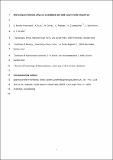Files in this item
Stereotypic horses (Equus caballus) are not cognitively impaired
Item metadata
| dc.contributor.author | Briefer Freymond, Sabrina | |
| dc.contributor.author | Ruet, Alice | |
| dc.contributor.author | Grivaz, Maurine | |
| dc.contributor.author | Fuentes, Camille | |
| dc.contributor.author | Zuberbühler, Klaus | |
| dc.contributor.author | Bachmann, Iris | |
| dc.contributor.author | Briefer, Elodie F. | |
| dc.date.accessioned | 2019-10-16T23:36:36Z | |
| dc.date.available | 2019-10-16T23:36:36Z | |
| dc.date.issued | 2019-01 | |
| dc.identifier | 256499991 | |
| dc.identifier | 6717794e-8276-48cc-9768-4a6fdf5c1b52 | |
| dc.identifier | 85055545782 | |
| dc.identifier | 000455324100002 | |
| dc.identifier.citation | Briefer Freymond , S , Ruet , A , Grivaz , M , Fuentes , C , Zuberbühler , K , Bachmann , I & Briefer , E F 2019 , ' Stereotypic horses ( Equus caballus ) are not cognitively impaired ' , Animal Cognition , vol. 22 , no. 1 , pp. 17-33 . https://doi.org/10.1007/s10071-018-1217-8 | en |
| dc.identifier.issn | 1435-9448 | |
| dc.identifier.other | ORCID: /0000-0001-8378-088X/work/64360765 | |
| dc.identifier.uri | https://hdl.handle.net/10023/18694 | |
| dc.description.abstract | Stereotypies in animals are thought to arise from an interaction between genetic predisposition and sub-optimal housing conditions. In domestic horses, a well-studied stereotypy is crib-biting, an abnormal behaviour that appears to help individuals to cope with stressful situations. One prominent hypothesis states that animals affected by stereotypies are cognitively less flexible compared to healthy controls, due to sensitization of a specific brain area, the basal ganglia. The aim of this study was to test this hypothesis in crib-biting and healthy controls, using a cognitive task, reversal learning, which has been used as a diagnostic for basal ganglia dysfunction. The procedure consisted of exposing subjects to four learning tasks; first and second acquisition, and their reversals. For each task, we measured the number of trials to reach criterion and heart rate and heart-rate variability. Importantly, we did not try to prevent crib-biters from executing their stereotypic behaviour. We found that the first reversal learning task required the largest number of trials, confirming its challenging nature. Interestingly, the second reversal learning task required significantly fewer trials to reach criterion, suggesting generalisation learning. However, we did not find any performance differences across groups; both stereotypic and control animals required a similar numbers of trials and did not differ in their physiological responses. Our results thus challenge the widely held belief that crib-biting horses, and stereotypic animals more generally, are cognitively impaired. We conclude that cognitive underperformance may occur in stereotypic horses if they are prevented from crib-biting to cope with experienced stress. | |
| dc.format.extent | 17 | |
| dc.format.extent | 959120 | |
| dc.language.iso | eng | |
| dc.relation.ispartof | Animal Cognition | en |
| dc.subject | Basal ganglia | en |
| dc.subject | Crib-biting | en |
| dc.subject | Learning capacity | en |
| dc.subject | QH301 Biology | en |
| dc.subject | Ecology, Evolution, Behavior and Systematics | en |
| dc.subject | Experimental and Cognitive Psychology | en |
| dc.subject | NDAS | en |
| dc.subject.lcc | QH301 | en |
| dc.title | Stereotypic horses (Equus caballus) are not cognitively impaired | en |
| dc.type | Journal article | en |
| dc.contributor.institution | University of St Andrews. Institute of Behavioural and Neural Sciences | en |
| dc.contributor.institution | University of St Andrews. Centre for Social Learning & Cognitive Evolution | en |
| dc.contributor.institution | University of St Andrews. School of Psychology and Neuroscience | en |
| dc.identifier.doi | 10.1007/s10071-018-1217-8 | |
| dc.description.status | Peer reviewed | en |
| dc.date.embargoedUntil | 2019-10-17 |
This item appears in the following Collection(s)
Items in the St Andrews Research Repository are protected by copyright, with all rights reserved, unless otherwise indicated.

